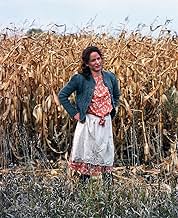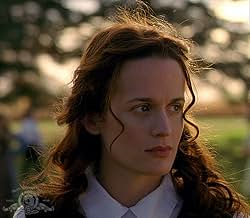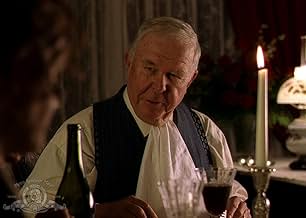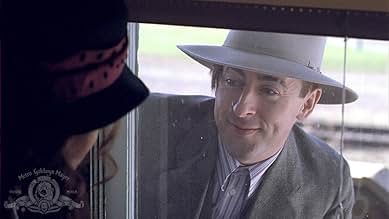PUNTUACIÓN EN IMDb
7,1/10
4,3 mil
TU PUNTUACIÓN
Añade un argumento en tu idiomaIn 1920, Inge, a German national, travels from Norway to rural Minnesota for her arranged marriage to Olaf, a Norwegian farmer; bureaucracy and prejudice cause major complications.In 1920, Inge, a German national, travels from Norway to rural Minnesota for her arranged marriage to Olaf, a Norwegian farmer; bureaucracy and prejudice cause major complications.In 1920, Inge, a German national, travels from Norway to rural Minnesota for her arranged marriage to Olaf, a Norwegian farmer; bureaucracy and prejudice cause major complications.
- Dirección
- Guión
- Reparto principal
- Premios
- 9 premios y 2 nominaciones en total
Reseñas destacadas
This is the story of a German mail order bride who moves to a small, Minnesota town filled with Norwegians who don't exactly embrace difference.
The movie creates a palatable tension between doing what you need to do to fit in with your community (what you're "supposed" to do) and finding love with someone who is different (what you should do).
That message resonates in today's political climate.
A funny, poignant, wonderfully acted movie, Sweet Land has the confidence to treat us as if we are intelligent. It lets us fill in the blanks and trusts us to understand what's going on without telling us everything. While this makes us work a little rather than sit back and be spoon fed the entertainment, the effort is well worth it.
For example, when characters speak German, instead of using subtitles, the filmmakers know we'll get the gist of the scene - even though we don't get the exact verbiage. Selim lets the emotion carry us and it works. This is delicate work but it's handled with care and talent.
Sweet Land is about how love is stronger than fear.
Very, very good movie...the kind they don't make in Hollywood. I'd compare it to Jean de Florette and the sequel Manon of the Spring. It's a simple story with complex emotions where the smallest details, like someone taking a huge bite of potatoes, say a lot.
Excellent movie.
The movie creates a palatable tension between doing what you need to do to fit in with your community (what you're "supposed" to do) and finding love with someone who is different (what you should do).
That message resonates in today's political climate.
A funny, poignant, wonderfully acted movie, Sweet Land has the confidence to treat us as if we are intelligent. It lets us fill in the blanks and trusts us to understand what's going on without telling us everything. While this makes us work a little rather than sit back and be spoon fed the entertainment, the effort is well worth it.
For example, when characters speak German, instead of using subtitles, the filmmakers know we'll get the gist of the scene - even though we don't get the exact verbiage. Selim lets the emotion carry us and it works. This is delicate work but it's handled with care and talent.
Sweet Land is about how love is stronger than fear.
Very, very good movie...the kind they don't make in Hollywood. I'd compare it to Jean de Florette and the sequel Manon of the Spring. It's a simple story with complex emotions where the smallest details, like someone taking a huge bite of potatoes, say a lot.
Excellent movie.
Delightful, richly imagined story of a young immigrant woman who comes from Norway to Minnesota in 1919 as a "mail order bride" to marry a Norwegian farmer. By turns slapstick funny, tender, ironic and sad, this movie successfully evokes the difficult life of foreign homesteaders in a new land, in a story told simply, with no pretensions and with a wondrous range of nuances.
We confront outrageous instances of religious, ethnic and political bigotry, and the cruel predations of wealthy money lenders who don't blink an eye when pressing foreclosures, ruining families who have sat elbow to elbow with them at church every Sunday for years. But we also see examples of kindheartedness, longing for love and gradually dawning romance, individual integrity and group justice, not to mention hilarious moments, both intentional and unintended.
Inge (Elizabeth Reaser, a luminous beauty) is the stalwart German woman who comes to marry the reticent Olaf (Tim Guinee), who had thought she was Norwegian like him, since she came from a town in Norway. Olaf is a character straight out of a Garrison Keillor monologue: he's the quintessential shy Norwegian bachelor farmer.
Inge, on the other hand, is deferential only because she can't speak English or Norwegian, only German, and that only with the church pastor, Rev. Sorrensen (John Heard), who refuses to conduct the wedding because Inge has no citizenship papers and, ironically, he is suspicious of her German roots, in a time when anti-German sentiment was still at a peak following WW I. Once Inge's got a handle on language, she starts to show her pluck, for, beneath her stunning physical beauty, Inge is in fact a forceful woman.
Comic relief is afforded in a marvelous turn by Alan Cumming as Frandsen, another - and altogether inadequate farmer. Rather than actually work at farming, Frandsen would much rather entertain his wife and nine kids, and his friends, with funny gestures and tunemaking. Cumming's performance reminds me of Ray Bolger as the scarecrow in Wizard of Oz, or Håkan Hagegård, as Papageno in Bergman's "The Magic Flute," or some of the masters of physical comedy in the silent film era. Rounding out a superb cast are Ned Beatty as Harmo, a ruthless banker, and Alex Kinston as Frandsen's wife, Brownie.
Director Ali Selim, a native of St. Paul, Minnesota, had a highly successful career making commercials for television before undertaking this picture, his debut feature narrative film. He worked from a short story by Bemidji writer Will Weaver, called "Gravestone Made of Wheat." The movie was shot on location in a rural area of southwest Minnesota. This film will leave you laughing and crying. It is a treasure. (In English, German and Norwegian) My grades: 8.5/10 (A-) (Seen on 12/26/06)
We confront outrageous instances of religious, ethnic and political bigotry, and the cruel predations of wealthy money lenders who don't blink an eye when pressing foreclosures, ruining families who have sat elbow to elbow with them at church every Sunday for years. But we also see examples of kindheartedness, longing for love and gradually dawning romance, individual integrity and group justice, not to mention hilarious moments, both intentional and unintended.
Inge (Elizabeth Reaser, a luminous beauty) is the stalwart German woman who comes to marry the reticent Olaf (Tim Guinee), who had thought she was Norwegian like him, since she came from a town in Norway. Olaf is a character straight out of a Garrison Keillor monologue: he's the quintessential shy Norwegian bachelor farmer.
Inge, on the other hand, is deferential only because she can't speak English or Norwegian, only German, and that only with the church pastor, Rev. Sorrensen (John Heard), who refuses to conduct the wedding because Inge has no citizenship papers and, ironically, he is suspicious of her German roots, in a time when anti-German sentiment was still at a peak following WW I. Once Inge's got a handle on language, she starts to show her pluck, for, beneath her stunning physical beauty, Inge is in fact a forceful woman.
Comic relief is afforded in a marvelous turn by Alan Cumming as Frandsen, another - and altogether inadequate farmer. Rather than actually work at farming, Frandsen would much rather entertain his wife and nine kids, and his friends, with funny gestures and tunemaking. Cumming's performance reminds me of Ray Bolger as the scarecrow in Wizard of Oz, or Håkan Hagegård, as Papageno in Bergman's "The Magic Flute," or some of the masters of physical comedy in the silent film era. Rounding out a superb cast are Ned Beatty as Harmo, a ruthless banker, and Alex Kinston as Frandsen's wife, Brownie.
Director Ali Selim, a native of St. Paul, Minnesota, had a highly successful career making commercials for television before undertaking this picture, his debut feature narrative film. He worked from a short story by Bemidji writer Will Weaver, called "Gravestone Made of Wheat." The movie was shot on location in a rural area of southwest Minnesota. This film will leave you laughing and crying. It is a treasure. (In English, German and Norwegian) My grades: 8.5/10 (A-) (Seen on 12/26/06)
i knew nothing about it before i saw sweet land at a film "class" preview. what a wonderful surprise. it is slow, thoughtful, with frames that are like beautiful photographs. the director gets more across with silence and facial expressions than most dialogue does. the actors are unique individuals - each performance a gem. and, the story is touching - the decent salt of the earth assimilated farmers who feel threatened by "other" outsiders. the two main characters beautifully portrayed as they work side by side and get to know each other. unique heartland music that respects the acting and dialogue and enhances without taking over at all. i highly recommend this for filmgoers who want to be touched and immersed. kudos to ali selim and fine company.
'Sweet Land' manages a difficult feat: it is a historical film with a clear message for the present, yet it avoids becoming either nostalgically cloying or preachily shrill. "Banking and farming don't mix" is not merely a phrase heard several times; it is the key to the confrontation of two utterly different, and utterly irreconcilable, attitudes toward land and life. Ned Beatty, as the chief banker, embodies the one, driven by money and power, harshly and repellently (it's a superb performance), but he and his few allies, and what they stand for, cannot completely overwhelm what most of the other characters, major and minor, believe in and represent: the importance of human connections, with each other and with the jobs they must carry out.
There is scarcely a false step in this film. Elizabeth Reaser brings Inge to life completely believably and very poignantly. We truly care about this woman, a fact made all the more astonishing when we realize that for a sizable part of the film she speaks in languages most of the American audience will not understand. It's one of the best performances I've seen in a long time. Similarly convincing is Tim Guinee as Olaf, her perplexed husband-to-be. His struggles to overcome prejudice (his own and that of his neighbors) are played with a delightful mix of humor, pathos, and inner strength which mirror the complex set of forces with which he must deal. Much the same could be said, albeit on a smaller scale, of the lesser parts; these performers inhabit these roles as if they had already lived them for real. Watch the interactions between Alan Cumming and Alex Kingston, for example; these are two people who are deeply and genuinely in love, but who recognize and accept the flaws of the other. There is no conventional 'happy marriage' insipidity here-- with the result that their marriage comes across as truly happy in a far more profound manner than so many others on screen.
Visually the film is often lovely. It is not as lusciously filmed as Terrence Malick's 'Days of Heaven', with which it shares an underlying approach, but it also avoids the occasional glossiness which undercut the down-to-earth elements of the earlier film's plot. Here the images rarely feel forced, and never overwhelm the intense sense of physical presence so vital to both plot and message. Also powerful is the use of two framing stories, linked to but not dependent upon the central plot. Indeed, the emotional climax of the film actually resides in the contemporary story, something we will not realize until almost the very end of the film. What seems a mere narrative trick suddenly resonates with tremendous power, and brings home the film's central theme beautifully yet without undue emphasis.
The flaws are few. The music, usually vaguely folksy without being especially engaging, is more than once rather too modern in its feel and too diffuse in its impact to support the visuals. The music is the weakest element in the film; at times it sounds almost as if the decision to add music was taken so late in production that all that was possible was some improvisational doodling, which fits neither the delicately shaped mood nor the careful pacing and structuring of the action. The important part of Minister Sorrensen is a bit awkwardly written, with his changes of outlook being rather too sudden; John Heard's performance, though thoughtful, could likewise be more nuanced (he was probably responding to the part as written, but in this case he would have been better off to play against the script).
'Sweet Land' is a beautiful, funny, and often very moving film, with a deep and respectful sense of history and human relations. Both the action and the thoughts it provokes will linger long after the curtain closes. The film has much to offer, and I recommend it very highly.
There is scarcely a false step in this film. Elizabeth Reaser brings Inge to life completely believably and very poignantly. We truly care about this woman, a fact made all the more astonishing when we realize that for a sizable part of the film she speaks in languages most of the American audience will not understand. It's one of the best performances I've seen in a long time. Similarly convincing is Tim Guinee as Olaf, her perplexed husband-to-be. His struggles to overcome prejudice (his own and that of his neighbors) are played with a delightful mix of humor, pathos, and inner strength which mirror the complex set of forces with which he must deal. Much the same could be said, albeit on a smaller scale, of the lesser parts; these performers inhabit these roles as if they had already lived them for real. Watch the interactions between Alan Cumming and Alex Kingston, for example; these are two people who are deeply and genuinely in love, but who recognize and accept the flaws of the other. There is no conventional 'happy marriage' insipidity here-- with the result that their marriage comes across as truly happy in a far more profound manner than so many others on screen.
Visually the film is often lovely. It is not as lusciously filmed as Terrence Malick's 'Days of Heaven', with which it shares an underlying approach, but it also avoids the occasional glossiness which undercut the down-to-earth elements of the earlier film's plot. Here the images rarely feel forced, and never overwhelm the intense sense of physical presence so vital to both plot and message. Also powerful is the use of two framing stories, linked to but not dependent upon the central plot. Indeed, the emotional climax of the film actually resides in the contemporary story, something we will not realize until almost the very end of the film. What seems a mere narrative trick suddenly resonates with tremendous power, and brings home the film's central theme beautifully yet without undue emphasis.
The flaws are few. The music, usually vaguely folksy without being especially engaging, is more than once rather too modern in its feel and too diffuse in its impact to support the visuals. The music is the weakest element in the film; at times it sounds almost as if the decision to add music was taken so late in production that all that was possible was some improvisational doodling, which fits neither the delicately shaped mood nor the careful pacing and structuring of the action. The important part of Minister Sorrensen is a bit awkwardly written, with his changes of outlook being rather too sudden; John Heard's performance, though thoughtful, could likewise be more nuanced (he was probably responding to the part as written, but in this case he would have been better off to play against the script).
'Sweet Land' is a beautiful, funny, and often very moving film, with a deep and respectful sense of history and human relations. Both the action and the thoughts it provokes will linger long after the curtain closes. The film has much to offer, and I recommend it very highly.
As a total movie addict, I was very surprised after attending a screening of this film to be so overwhelmed by the quality of the photography and the depth of the acting.
The visual images in this film are simple, yet breathtakingly beautiful in their composition. It is a rare masterpiece with amazing use of time, depth and perspective. The development of the romantic tension between the main characters in the love story was so powerful and yet so subtle, that it was like a fresh breath mint on a cold January morning.
The used of time and flashbacks is amazing, and the editing and pace of the movie is very accomplished for an independent, low budget film. I will not be surprised if I hear about this move at Oscar time.
The visual images in this film are simple, yet breathtakingly beautiful in their composition. It is a rare masterpiece with amazing use of time, depth and perspective. The development of the romantic tension between the main characters in the love story was so powerful and yet so subtle, that it was like a fresh breath mint on a cold January morning.
The used of time and flashbacks is amazing, and the editing and pace of the movie is very accomplished for an independent, low budget film. I will not be surprised if I hear about this move at Oscar time.
¿Sabías que...?
- CuriosidadesElizabeth Reaser' Norwegian pronunciation was so bad that after Dagbladet (one of Norway's biggest news-papers) stumbled upon this film, they posted a clip from it with the title "What is she trying to say?"
- PifiasThey harvest an entire field of corn between the two of them, when they get back to the barn, the crop is suddenly wheat. They go through the whole "separating the wheat from the chaff" process, and pour the seed into sacks.
- Citas
Old Inge: Olaf died, Frandsen.
Old Frandsen: [considering for a moment] No. Olaf is in the fields.
Old Inge: [slowly glancing out the window and remembering]
- Banda sonoraEskimo Kisses
Music and Lyrics by Thomas Lieberman (as T.F. Lieberman)
Published by Liza Rose Music (ASCAP)
Performed by Thomas Lieberman (as Tom Lieberman)
Selecciones populares
Inicia sesión para calificar y añadir a tu lista para recibir recomendaciones personalizadas
- How long is Sweet Land?Con tecnología de Alexa
Detalles
- Fecha de lanzamiento
- País de origen
- Sitio oficial
- Idiomas
- Títulos en diferentes países
- Wedding Photo
- Localizaciones del rodaje
- Empresas productoras
- Ver más compañías en los créditos en IMDbPro
Taquilla
- Presupuesto
- 1.000.000 US$ (estimación)
- Recaudación en Estados Unidos y Canadá
- 1.706.325 US$
- Fin de semana de estreno en EE. UU. y Canadá
- 41.860 US$
- 15 oct 2006
- Recaudación en todo el mundo
- 1.843.537 US$
- Duración1 hora 50 minutos
- Color
- Mezcla de sonido
- Relación de aspecto
- 1.85 : 1
Contribuir a esta página
Sugerir un cambio o añadir el contenido que falta

Principal laguna de datos
By what name was Sweet Land (2005) officially released in India in English?
Responde





















